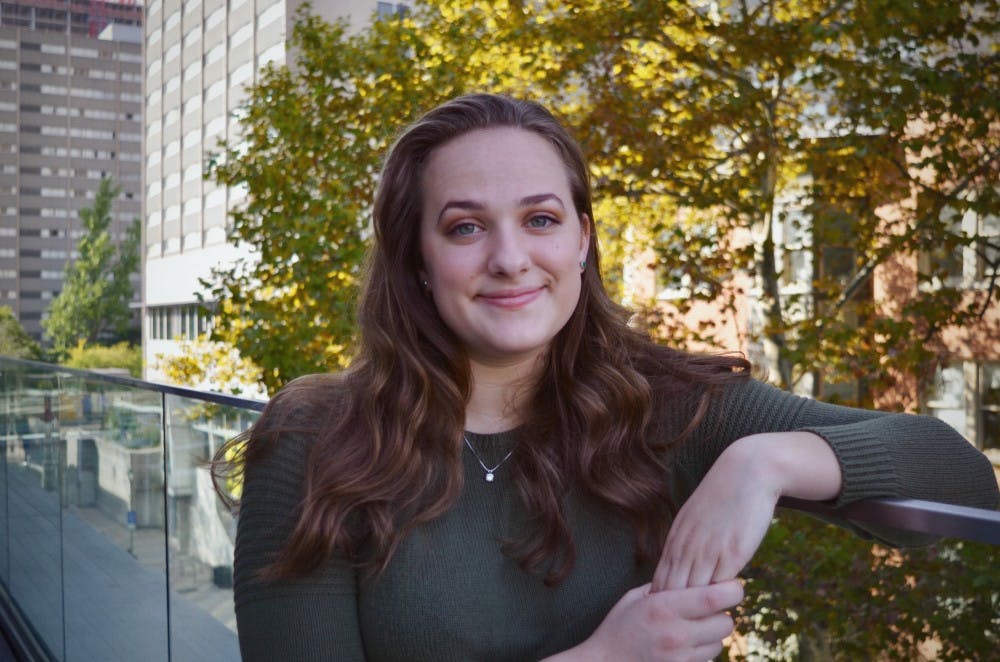Tori Borlase (C '22), laughs and says “give me a second,” when I ask about her activities on and off campus. She needs more than a second to list off her numerous involvements.
She is a PPE major, currently both a novice trainer and a national equity officer for the Penn Debate Society, a UA College Representative in the academic initiatives committee and budget committee, a project coordinator for the Free Library of Philadelphia, and a member of the nonprofit organization New Climate Lobby.
I ask her to tell me a little bit more about New Climate Lobby and her involvement with the climate strike.
“It’s really just us,” Tori says, as she tells me about her friend, Vyshnavi Kosigi (C’ 22), who started the organization. They met the summer after their junior year of high school in Girls Nation, a youth senate program where they were each representatives for their respective states. They kept in touch and then came to Penn together, asking each other which project they wanted to start next.
“Specifically for the climate strike, we were sitting around in the summer and thinking, ‘the climate strike’s happening, we should look into what’s going on in Philly,’ and there was nothing yet, so we went on Action Network and posted about a climate strike event.”
Once they had started planning the strike, Tori realized how challenging it was to organize such a large–scale event in a major city like Philadelphia.
“It was kind of daunting,” she adds.
She mentions that the strike gained traction rapidly with national movements, such as the Sunrise Movement, volunteering to help plan it. The process itself was a youth–centered collaborative environment where college and high school students were the main organizers.
Working with young organizers created an interesting dynamic because “they [didn’t] know what they’re doing any more than we do,” she says. “It was a challenge, but we were so driven to create change that we decided to stick with it.”
As for Tori specifically, her main role in planning the strike involved reaching out to press, communicating with high schools to coordinate student participation, lining up speakers during the event, and making sure social media was in check.

“I didn’t really have one job, it’s more like, we need people to do certain things, and you step up if you’re interested,” she notes.
I ask her about her other activities and what she is most involved in on campus “I hate picking a favorite child,” she sighs, “what I think takes most of my time is debate.”
She tells me about her roles on the Penn Debate Society, one of which is being a novice trainer. As a trainer, Tori is in charge of making new members feel welcome and familiarizing them with college–style debate. She’s also a national equity officer during tournaments, which entails monitoring what is said during debates and taking the necessary disciplinary action if anyone feels uncomfortable due to inappropriate comments.
“It makes me feel like I can make a change in the debate space, I feel like it’s my job that everyone who wants to do debate can debate in a safe environment,” Tori says.
As for creating a safer and better environment at Penn, the Philadelphia community and beyond, Tori is in the midst of many projects.
As UA Representative in the academic initiatives committee, Tori is working on a project to give students in the College of Arts & Sciences access to syllabi from previous courses.
“Wharton already has this, so I’m trying to get this for everyone,” she says. She’s also a member of the budget committee, which manages the money to fund clubs and other student projects.
Through New Climate Lobby, she has started an initiative for a plastic bag ban in the greater Philadelphia area. So far, New Climate Lobby has met with councilmen to get the issue on the agenda. After this, New Climate Lobby will also focus on a styrofoam ban.
As for plans after Penn, Tori wants to go directly to law school, possibly focusing on criminal justice reform or anti–discriminatory law, with a lot of involvement in pro bono cases. She says that all of her extracurriculars have their unique aspects, but each give her skills that translate well into law school and her future career.
“Just knowing that I’m helping people is really important to me. I think having the academic burden as well as the extracurricular burden can help me do my job with a sense of balance and know that I can achieve anything I set my mind to,” she says.







